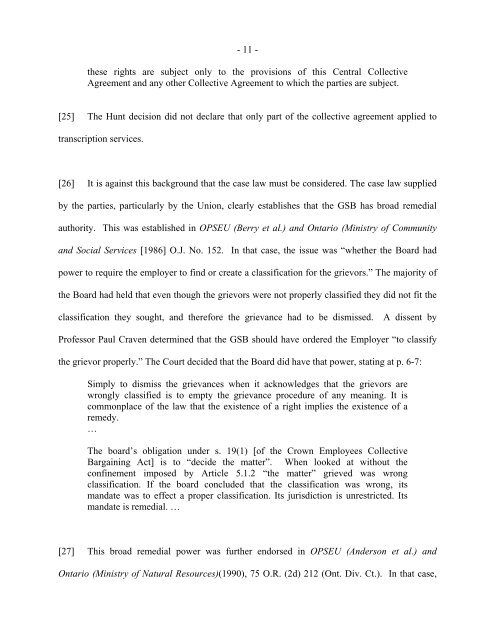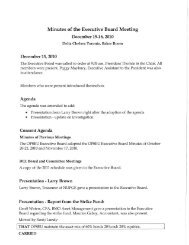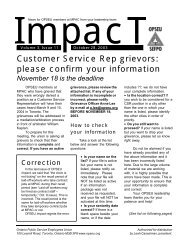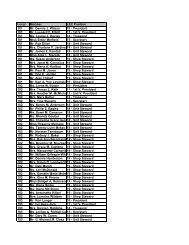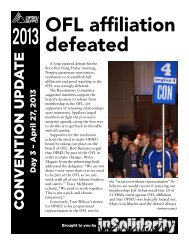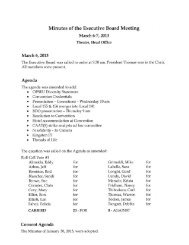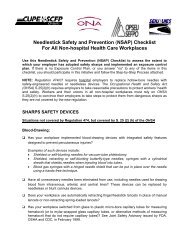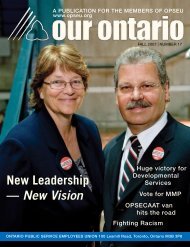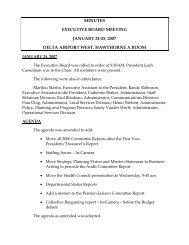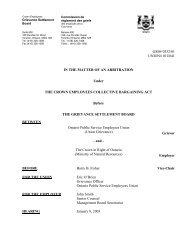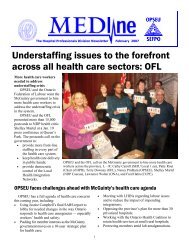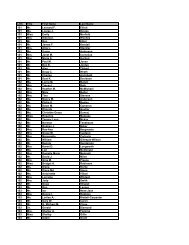2009 - OPSEU (Hunt et al) and Ministry of Attorney General, GSB ...
2009 - OPSEU (Hunt et al) and Ministry of Attorney General, GSB ...
2009 - OPSEU (Hunt et al) and Ministry of Attorney General, GSB ...
- No tags were found...
Create successful ePaper yourself
Turn your PDF publications into a flip-book with our unique Google optimized e-Paper software.
- 11 -these rights are subject only to the provisions <strong>of</strong> this Centr<strong>al</strong> CollectiveAgreement <strong>and</strong> any other Collective Agreement to which the parties are subject.[25] The <strong>Hunt</strong> decision did not declare that only part <strong>of</strong> the collective agreement applied totranscription services.[26] It is against this background that the case law must be considered. The case law suppliedby the parties, particularly by the Union, clearly establishes that the <strong>GSB</strong> has broad remedi<strong>al</strong>authority. This was established in <strong>OPSEU</strong> (Berry <strong>et</strong> <strong>al</strong>.) <strong>and</strong> Ontario (<strong>Ministry</strong> <strong>of</strong> Community<strong>and</strong> Soci<strong>al</strong> Services [1986] O.J. No. 152. In that case, the issue was “wh<strong>et</strong>her the Board hadpower to require the employer to find or create a classification for the grievors.” The majority <strong>of</strong>the Board had held that even though the grievors were not properly classified they did not fit theclassification they sought, <strong>and</strong> therefore the grievance had to be dismissed. A dissent byPr<strong>of</strong>essor Paul Craven d<strong>et</strong>ermined that the <strong>GSB</strong> should have ordered the Employer “to classifythe grievor properly.” The Court decided that the Board did have that power, stating at p. 6-7:Simply to dismiss the grievances when it acknowledges that the grievors arewrongly classified is to empty the grievance procedure <strong>of</strong> any meaning. It iscommonplace <strong>of</strong> the law that the existence <strong>of</strong> a right implies the existence <strong>of</strong> aremedy.…The board’s obligation under s. 19(1) [<strong>of</strong> the Crown Employees CollectiveBargaining Act] is to “decide the matter”. When looked at without theconfinement imposed by Article 5.1.2 “the matter” grieved was wrongclassification. If the board concluded that the classification was wrong, itsm<strong>and</strong>ate was to effect a proper classification. Its jurisdiction is unrestricted. Itsm<strong>and</strong>ate is remedi<strong>al</strong>. …[27] This broad remedi<strong>al</strong> power was further endorsed in <strong>OPSEU</strong> (Anderson <strong>et</strong> <strong>al</strong>.) <strong>and</strong>Ontario (<strong>Ministry</strong> <strong>of</strong> Natur<strong>al</strong> Resources)(1990), 75 O.R. (2d) 212 (Ont. Div. Ct.). In that case,


